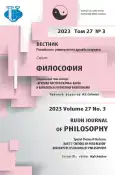Discourses about Miracle: Spectrum of Positions
- Authors: Zolotukhina-Abolina E.V.1
-
Affiliations:
- Southern Federal University
- Issue: Vol 27, No 3 (2023): KANT’S “CRITIQUE OF PURE REASON” AND WAYS OF ITS READING BY PHILOSOPHERS
- Pages: 793-808
- Section: PERSON AND SOCIETY
- URL: https://journal-vniispk.ru/2313-2302/article/view/325251
- DOI: https://doi.org/10.22363/2313-2302-2023-27-3-793-808
- EDN: https://elibrary.ru/JGUISO
- ID: 325251
Cite item
Full Text
Abstract
The study is devoted to construct a typology of discourses about a miracle. Discourses are interpreted in this case not in a linguistic, but in a philosophical sense, as a certain “way of talking” about a chosen phenomenon. This includes the ontological and ideological position of the speaker (writer), emotional and value pathos, a communicative attitude or lack thereof, a message to the listener (reader) of specific views and beliefs. The author distinguishes three groups of discourses on the ideological basis: 1) a miracle, understood as supernatural, but accessible for communication; 2) a miracle understood as a man-made, purely human phenomenon; 3) a miracle as the result of a “dual determination” coming from both the transcendent and the person himself. The miracle is initially interpreted in the article as a positive phenomenon that can be described and expressed in speech without directly naming the word itself. Within the first group of discourses, the following are considered: religious (Christian), mythological and fairy-tale discourse, and the fate-providentialist discourse is also highlighted. The second approach, connected with the denial of the supernatural, speaks of a miracle in the context of its scientific and technical creation, as well as hopes for a miracle within the framework of progressive and utopian concepts. The third type of discourses, combining the view of a miracle as coming from above and from the person himself, includes mystical-magical, existential and creativistic discourses - interpreting the theme of creativity. The mystical-magical discourse describes a miracle as the result of illumination and as a consequence of persistent spiritual searches. In the existential discourse, represented by fiction, there is also a place for describing a miracle as a magical nature and a magical fate. In creative discourse, the miracle is the very act of the birth of a new one. Summing up what has been said, the author emphasizes that he presents readers with nothing more than a sketch that requires further work and thematic disclosure.
About the authors
Elena V. Zolotukhina-Abolina
Southern Federal University
Author for correspondence.
Email: elena_zolotuhina@mail.ru
ORCID iD: 0000-0002-5954-2758
PhD in Philosophy, Professor
105 Bolshaya Sadovaya St., 344006, Rostov-on-Don, Russian FederationReferences
- Abysheva EM. Conceptual inversions of the "miracle" concept (based on Russian and Irish proverbs, sayings) [Internet]. Available from: https://rusneb.ru/catalog/000199_ 000009_003452613/ (accessed: 04.03.2023). (In Russian).
- Aleksandrov SS. A miracle in the Old Russian military stories of the XIV—XV centuries. Izvestija Saratovskogo universiteta Ser. Filologija. Zhurnalistika. 2018;18(1):35—39. (In Russian). https://doi.org/10.18500/1817-7115-2018-18-1-35-39
- Astapov SN. Personalist and symbolic conception of a miracle in A.F. Losev’s philosophy. Gumanitarnye i social'nye nauki. 2015;(2). Available from: https://cyberleninka.ru/article/ n/lichnostno-simvolicheskaya-kontseptsiya-chuda-v-filosofii-a-f-loseva (accessed: 01.03.2023). (In Russian).
- Pluzhnikova KN. The evolution of the Poetics of the miracle in the work of Gabriel Garcia Marquez in the 1990—2000s [dissertation]. [Internet]. Available from: https://www.dissercat.com/content/evolyutsiya-poetiki-chuda-v-tvorchestve-gabrielya-garsia-markesa-v-1990-2000-kh-gg/read/ (accessed: 05.03.2023). (In Russian).
- Sadykova AG. The category of a real, or natural, miracle: the problem of philosophical interpretation. Ufa: RIO BashGU [Internet]. Available from: https://search.rsl.ru/ru/ record/01002823053/ (accessed: 04.03.2023). (In Russian).
- Statkevich IA. The phenomenon of miraculous healing: myth, reality, causality (Philosophical analysis) [dissertation]. Cheboksary, 2002. [Internet]. Available from: https://rusneb.ru/catalog/000200_000018_RU_NLR_bibl_374021/ (accessed: 04.03.2023). (In Russian).
- Stepanova ES. Myths about miraculous healings: linguistic and axiological aspects. Bulletin of the Moscow State Regional University (Linguistics). 2022;(1):24—32. (In Russian). https://doi.org/10.18384/2310-712x-2022-1-24-32
- Frumkin KG. Miracle theories in the Age of Science. Epistemology & Philosophy of Science. 2005;5(3):153—172. (In Russian). https://doi.org/10.5840/eps20055338
- Jakovlev VV. Miracles in the Interpretation of G.V. Leibniz: on the question of the uniqueness of the concept. Srednerusskii vestnik obshchestvennykh nauk. 2012;(1):33—39. (In Russian).
- Le Goff Zh. The medieval imagination. Moscow: Izd. gruppa «Progress» publ.; 2001. (In Russian).
- Gurevich AJa. Culture and society of medieval Europe through the eyes of contemporaries. Moscow: Iskusstvo publ.; 1989. (In Russian).
- Propp VJa. Morphology of a fairy tale. Moscow: Labirint publ.; 2001. (In Russian).
- Zhukova EA. High technology: between Science and Miracle. TSPU Bulletin. 2012;5(120). [Internet]. Available from: https://cyberleninka.ru/article/n/vysokie-tehnologii-mezhdu-naukoy-i-chudom (accessed: 01.03.2023). (In Russian).
- Hel' I. Seven wonders of the world of technology [Internet]. 08.06.2014. Available from: https://hi-news.ru/technology/sem-chudes-mira-texnologij.html (accessed: 05.03.2023). (In Russian).
- Murtazin Je. The familiar wonders of technology in everyday life. Mobile review. [Internet]. 04.02.2021. Available from: https://mobile-review.com/all/articles/misc/privychnye-chudesa-tehnologij-v-povsednevnoj-zhizni/ (accessed: 05.03.2023). (In Russian).
- Talbot M. Holographic universe. Moscow: Sofiya publ.; 2004. (In Russian).
- Bjokk R. From Self to Cosmic Consciousness. In: White J. What is enlightenment. Moscow: AST publ., Izdatel’stvo Instituta transpersonal'noi psikhologii publ., Izd. Kravchuka publ.; 2004. P. 30—47. (In Russian).
- Frank SL. The Incomprehensible. In: Works. Moscow: Pravda publ.; 1990. P. 183—559. (In Russian).
- Bart R. Fragments of a lover's speech. Moscow: Ad marginem publ.; 1999. (In Russian).
- Maslou A. The farther reaches of human nature. Saint Petersburg: Evraziya publ.; 1997. (In Russian).
Supplementary files









